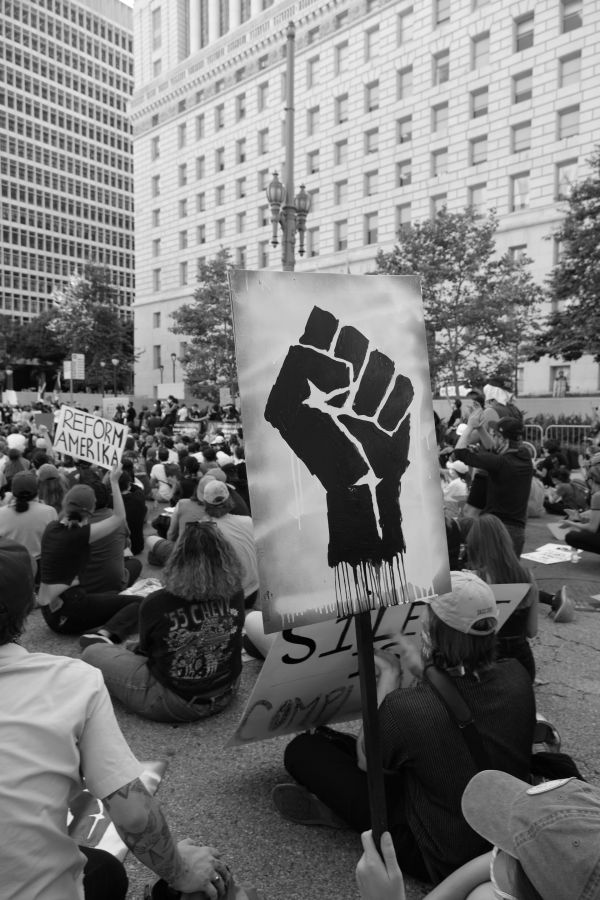Holding My Gaze

Dear Church,
This week I’ve been practicing “holding my gaze.” It’s my intention to stay focused on the crisis of events that begin with pandemic, escalate with the murder of George Floyd, and develop into the massive unrest in our country that we witness through the news, social media feeds, and accounts of our friends and family living in urban America. I’m practicing because the privilege of living here in Jackson, on top of the privilege I already experience as a middle-aged, white guy in America, affords me the choice of receding deeper into our dreamy bubble here in the valley in an attempt to avoid the pain, confusion, violence, rhetoric, outrage, apathy, and chaos happening in other parts of this country of ours that we love. I believe ignoring it, sheltering from it is not good for me. I believe it’s not good for us. So, I’ve tried to find a place along the continuum equidistant between apathy or denial and outrage. I don’t believe either of the poles will allow me, us, to take the course of painful self-discovery necessary for the healing and racial reconciliation our country is crying for, deserves, and, I believe, aspires to.
I am committing myself to this work not because I am either a democrat or a republican, a liberal or a conservative, but because I am seeking to become the most devoted follower of Jesus I can be. I don’t view our country’s struggle with racial injustice as a political problem. I see it as a moral problem. If we intend to be moral leaders in our community, and we do, then we are required to address the moral problems of the day attempting to find resolution, healing, and reconciliation. For me, this lies in the area of “if not us, then who?” The work is hard, and will require our most sincere efforts and a mountain of help from God.
As a student of Jesus and his “Way,” I know the way forward for me, for us, is painful and challenging. As white Americans, as most of us, many of us are, I believe the work ahead includes laying down our power. Some of you are bristling now. Laying down our power is antithetical to the way most of us were raised, especially us men. It seems un-American, even. Maybe. Yet, the story of Jesus narrates the empowered laying down power for the sake of the other. Paul’s second letter to the Corinthians reminds us “That God’s grace is sufficient, and power is made perfect in weakness.” The work is so challenging. So challenging, and, yet, it’s ours.
If we are to engage this work of racial reconciliation, I believe it’s important for us to first “get on the same page.” I don’t mean we have to think the same thoughts or feel the same feelings. I mean that we need some common place to start together, so that we are united in our approach, in our attempts to bring some form of healing and racial reconciliation. Further, it’s important that we “do no harm.” I believe most harm done during attempts for healing have come accidentally and with the best of intentions, nevertheless we acknowledge that our efforts might still injure people we are seeking to love. We will have to be so careful.
I believe a good starting point for our faith family is a collective reading of Austin Channing Brown’s I’m Still Here: Black Dignity in a World Made for Whiteness. Most of us on staff here at church have read Brown’s book, and some of us led and joined an ecumenical effort to read and discuss her book with some chosen leadership here in our Jackson community. Our efforts had some success and many failures, and in the end, some learning for us all. Make time for Brown’s story. Create an openness for the truth she delivers with her willing vulnerability. Empathize with her painful experience she courageously shares.
After a time, we will find a way to come together and talk about her story and share in our experience of reading her words. (I wish I could be more specific here, and I am not keen to plan without offering details; however, the pandemic still demands caution around gathering as a group. And, yet, the current crisis we face demands we take up the work of healing and racial reconciliation now.)
Church, we all come to this work with our own stories and experiences. Some of those stories might be cherished memories, others may tell the story of our individual or collective trauma. Again, we will be careful here because our intent is to affect healing and love.
Some of you reading this letter will believe we’re not going far enough or fast enough. Others will feel I’ve gone too far in suggesting we take time and attention to focus on racism, particularly the experience of Black America. All I can ask for me and for other leaders of our parish is your patience, your openness and a small measure of trust. I remain hopeful and ambitious when it comes to our ability to spread love in our community and beyond. For now, pray, cry, hug those you are sheltering with, pay your taxes, give generously, feed the hungry, strive for great personal growth and depth, ask for help when you need it, read Brown’s book, and know that you are beloved of God.
Love,
Jimmy

